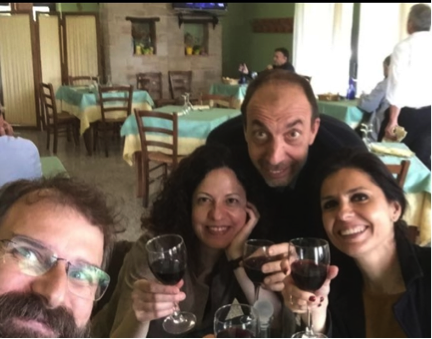Group Leader: Stefano Farioli Vecchioli
Topic: Neurobiology
Main Topics
- Study of the role of the cell cycle mediators in the regulation of adult neurogenesis through the use of genetically modified mouse models. Very recently we are analyzing a new murine strain in which the deletion of the p21 gene (one of the main cell cycle regulators) in adult neural stem cells occurs, through the recombinant Cre-LoxP technology: the nestinCre-LoxP p21 mouse.
- Study of the proneurogenic action of physical activity (running) in triggering the process of proliferation, differentiation and functional integration of newborn neurons in the main neurogenic niches in mouse models at different development stages.
- Role of Running Activated Neural Stem Cells (RANS cells) during the neuro-regenerative processes in response to brain damage caused by Traumatic Brain Injury (TBI).
- Study of the neuro-reparative response following TBI in the nestinCre-LoxP p21 mouse model.
- Together with Dr. Francesca De Santa, Dr. Carla Petrella and Dr. Georgios Strimpakos of the IBBC we have created the Gut-Brain Microbiota Group (GBM Group), which aims to study, through a multidisciplinary approach, the role of probiotics in the processes of neurogenesis and neuroinflammation in the mouse brain. The first study is dedicated to the proneurogenic and neuroprotective role of the probiotic Lactobacillus farciminis before the systemic acute administration in mice of the bacterial endotoxin Lipopolysaccharide (LPS). Moreover, in collaboration with Beingpharma Pharmaceutic we are testing a new probiotic mixture by utilizing the experimental protocol described above. Finally, the GBM Group is going to extend its research activity to areas that are not purely neural, by analyzing the role of Lactobacillus farcimins in alleviating the chronic inflammatory mechanism characterizing the mouse model recapitulating muscular pathology observed in the Duchenne’s syndrome (the mdx mice model).
Activities of research in collaboration
- Study of the neuroprotective and therapeutic role of the polyunsaturated fatty acids (PUFA), in elderly mice under physiological conditions and subjected to the administration of saponin, which induces the selective elimination of cholinergic neurons, mimicking the neurological damage caused by Alzheimer’s Disease. This project is in collaboration with the group lead by the Prof. Laura Petrosini of the Santa Lucia Foundation, Rome.
- Study of the role of genes regulating the alternative splicing during embryonic neurogenesis. In collaboration with the group lead by Prof. Claudio Sette of Chatolic Universitiy of Sacro Cuore, Rome.
- Analysis of the functional activation of neurons in specific brain regions of BTBR mice characterized by a phenotype recapitulating some of neuro-pathological signs attributable to autism. In collaboration with Dr. Gemma Calamamndrei’s group od the Istituto Superiore di Sanità, Rome.
Scientific Dissemination Activities
- Collaboration with the L’Espresso/La Repubblica and Il Corriere della Sera editorial media gruops for the writing of scientific articles or in-depht boxes in the field of different aspect of neurobiology.
- Author of the book UN CERVELLO SEMPRE GIOVANE; 2017, Sperling&Kupfer editor.
Key Publications
Daniela Canzoniere*, Stefano Farioli-Vecchioli *, Filippo Conti, Maria Teresa Ciotti, Ada Maria Tata, Gabriella Augusti-Tocco, Elisabetta Mattei, Madepalli K. Lakshmana, ValeryKrizhanovsky, Steven A. Reeves, Roberto Giovannoni, Francesca Castano, Antonio Servadio, Nissim Ben-Arie, and Felice Tirone “Dual control of neurogenesis by PC3 through cell cycle inhibition and induction of Math1” The Journal of Neuroscience (2004) 24 (13):3355–3369. Equal contribution.
Farioli-Vecchioli S., Saraulli D., Costanzi M., Pacioni S., Cinà I., Aceti M., Micheli L., Bacci A., Cestari V., Tirone F., “The Timing of Differentiation of Adult Memory Hippocampal Neurons is Crucial for Spatial Memory”, PLOS Biology (2008)
Farioli-Vecchioli S., Irene Cinà, Manuela Ceccarelli, Laura Micheli, Luca Leonardi, Maria Teresa Ciotti, Marco De Bardi, Concezio Di Rocco, Roberto Pallini, Sebastiano Cavallaro, Felice Tirone. Tis21 knockout enhances medulloblastoma frequency in Patched heterozygous mice by inihibiting the Cxcl3-dependent migration of cerebellar neurons. J Neurosci. 2012 Oct 31;32(44):15547-64.
Stefano Farioli-Vecchioli*, Andrea Mattera, Laura Micheli, Manuela Ceccarelli, Luca Leonardi, Daniele Saraulli, Marco Costanzi, Vincenzo Cestari, Jean-Pierre Rouault, and Felice Tirone*. Running rescues defective adult neurogenesis by shortening the length of the cell cycle of neural stem and progenitor cells. Stem Cells 2014; 32 (7): 1968-1982. * Corresponding authors.
Piergiorgio La Rosa, Pamela Bielli, Claudia Compagnucci, Eleonora Cesari, Elisabetta Volpe, Stefano Farioli Vecchioli, Claudio Sette. SAM68 promotes self-renewal and glycolitic metabolism in neural progenitor cells by modulating ALDH1A3 pre-mRNA 3′-end processing. 2016 eLife. 5. pii: e20750.
Nicolis di Robilant V., Scardigli R., Strimpakos G., Tirone F., Middei M., Scopa C., De Bardi M, Battistini L, Saraulli D., and Farioli Vecchioli S. Running-activated neural stem cells enhance subventricular neurogenesis and improve olfactory behaviour in p21 knockout mice. Mol Neurobiol. 2019 Nov;56(11):7534-7556.
GBM Group

Researchers:
Francesca De Santa
Carla Petrella: Carla.Petrella@cnr.it
Georgios Strimpakos: georgios.strimpakos@cnr.it
Post-doctoral fellows:
Alessio Torcinaro:Alessio.torcinaro@libero.it
Graduate student:
Andrea Macioce
Program & Resources
- Granting Agency: Compagnia di San Paolo –Period: 2004-2007. Title of the project: Study of the PC3 proneural and antiproliferative gene in the development of the cerebellum and the onset of cerebellar tumor, medulloblastoma, and its use in antitumor gene therapy. Role: Collaborator.
- Granting Agency: FILAS-Regione Lazio – Period: 2005-2008. Title of the project: Brain Research Development – Molecular and Behavioral Aspects of Nervous System Diseases Role: Collaborator.
- Granting Agency: PRIN Italian Ministry of Education MIUR – Period: 2008-2012. Title of the project: Control of gene activation by the PC3 / BTG2 gene in neural development, in normal and tumor conditions. Role: Collaborator.
- Granting Agency: FareBio CNR Period: 2011-2015. Title of the project: Quality Biotechnological Drugs and Networks. Role: Collaborator.
- Granting Agency: FSH Society – Period: 2017-2019. Title of the project: Activity of estrogen on FSHD muscle differentiation. Role: Collaborator.
- Granting Agency: Beingpharma – Period 2019-2020. Title of project: Role of BP-002 in gut brain axis. Role: Responsible.
